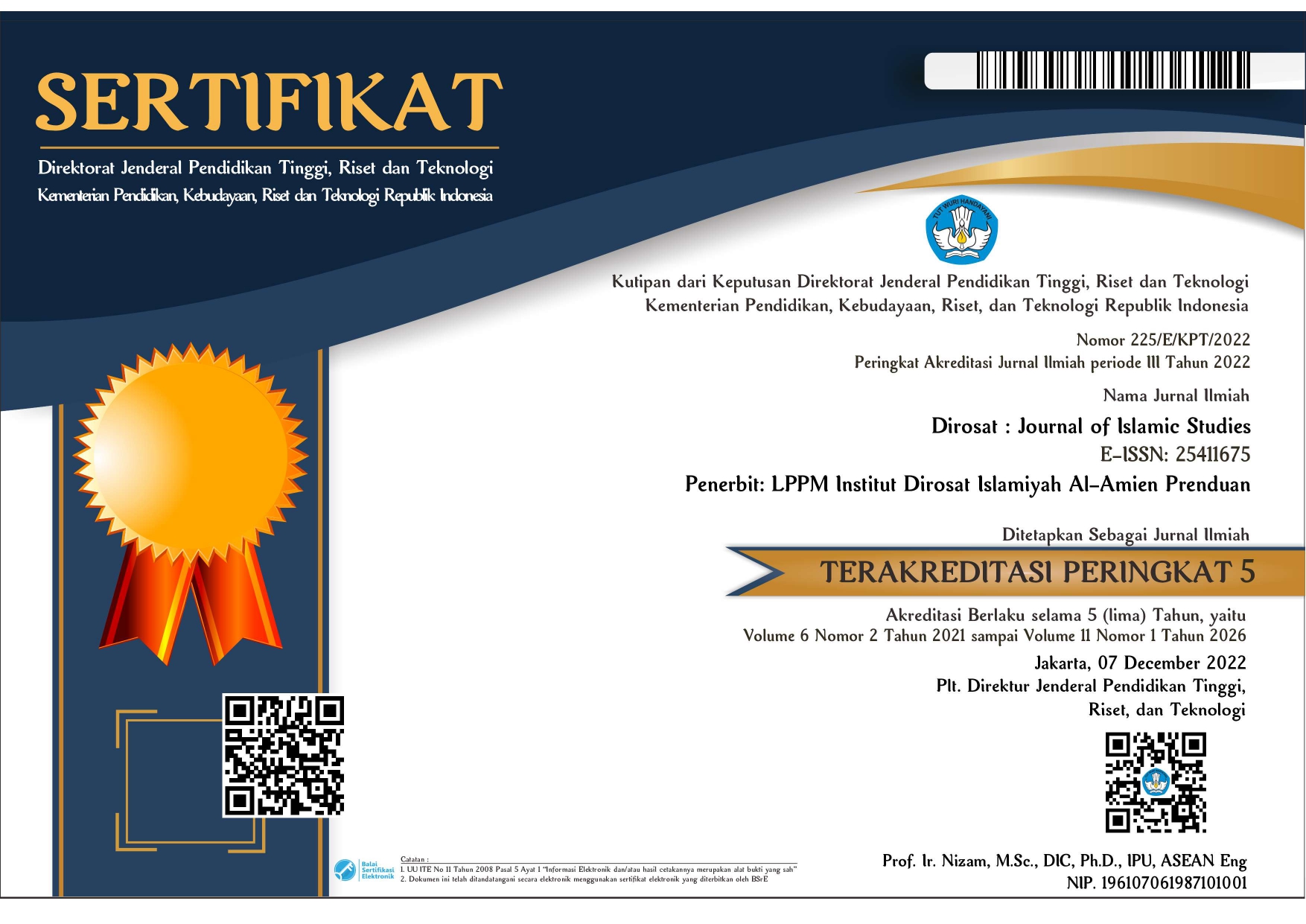MULTILEADERSHIP DAN RELEVANSINYA DENGAN PENGEMBANGAN NILAI-NILAI PESANTREN
Abstract
The study of leadership of kiai in pesantren is always an intriguing topic of discussion, particularly when viewed through the lens of leadership dynamics evolving alongside the changing context of modern times. This research adopts a qualitative approach with a case study methodology. The primary objective of the study is to explore the concept of the utility of multi-leader kiai in the modernization era and to examine the relevance of multi-leader kiai to the development and diversity of pesantren values. The findings of this study reveal the following: First, the concept of multi-leadership is realized through the institutionalized role of the kiai. The kiai positions himself as the central figure, a decision-maker, and is actively involved in all activities of the pesantren, including intra-curricular, extracurricular, and co-curricular programs. Additionally, the kiai assumes the role of al-abb ar-ruhani (spiritual father) for the pesantren community and is actively engaged in external activities. Second, the strategy for instilling values is implemented through role modeling and the development of both cognitive and affective aspects. The kiai instills values by setting an example, nurturing cognitive and affective dimensions, and guiding actions that align with pesantren values. This study underscores the critical role of kiai as a multi-leader figure in maintaining the integrity of pesantren traditions while adapting to the challenges of modernization.
Keywords
References
Agus Rahmat, Hendarmawan Edy Suryadi, Cipta Endyana. “Peran Opinion Leader Dalam Masyarakat Transisi, Seminar Nasional Politik Dan Kebudayaan.” Seminar Nasional Politik Dan Kebudayaan. Bandung, 2016.
Amini, Izzat. “Manajemen Pembelajaran Berbasis Nilai Pesantren.” Universitas Islam Negeri Maulan Malik Ibrahin, 2022.
Amir Hadari dan M. Ishom El-Saha. “Peningkatan Mutu Terpadu Pesantren Dan Madrasah Diniyah,” 22. Jakarta: Diva Pustaka, 2004.
Anis Dwi Nihayah. “Analisis Kemampuan Berpikir Abstrak Siswa SMA Dalam Materi Geometri” 8, no. 1 (2021): 1–2.
Basori Ruchman. The Founding Father Pesantren Modern Indonesia. Jakarta: Inchies, 2006.
Cecep Hasib dan Husaini Usman. “Karakteristik Kepemimpinan Kiai Generasi Ketujuh Di Pondok Pesantren Riyadlul Ulum Wadda’wah Tasikmalaya.” Akuntabilitas Manajemen Pendidikan 4, no. 2 (2016): 1.
Ditpekapontren Ditjen Kelembagaan Agama Islam. “Pembelajaran Di Pesantren,” 119, 2003.
Djamaluddin dan Abdullah Aly. Orientasi Pengembangan Pendidikan Pesantren Tradisional. Jakarta: Prenada, 2009.
Guntur Cahaya Kesuma. “Pesantren Dan Kepemimpinan Kiai.” Jurnal Pendidikan Dan Pembelajaran Dasar 1, no. 1 (2014): 18.
Herlinawati. “Paternalistic Leadership Style and Work Ethos on Employee Performance.” Bandung, 2019.
Khamami Zada, Dkk. Intelektualisme Pesantren; Potret Tokoh Dan Cakrawala Pemikiran Di Era Pertumbuhan Pesantren. Jakarta: Diva Pustaka, 2003.
Luthfi Noor Muntafi’ah. “Sistem Pengambilan Keputusan Dalam Model Kepemimpinan Kolektif Di Bamrung Islam School Pattani Thailand.” Muslim Heritage 3, no. 2 (2019): 7.
Matthew B. Miles, A. Michael Huberman, Johnny Saldana. “Qualitative Data Analysis: A Methods Sourcebook.,” 3rd ed., 8–9. Washington: Sage Publications, 2014.
Muhammad Idris Jauhari. “Observasi.” n.d.
Muhammad Musfhi El Iq Bali dan Susilowati. “Transinternalisasi Nilai-Nilai Kepesantrenan Melalui Konstruksi Budaya Religius Di Sekolah,” n.d., 4.
Mujamil Qomar. “Pesantren; Dari Transformasi Metodologi Menuju Demokratisasi Institusi,” 49. Jakarta: Erlangga, 1996.
Somantri, M.I. “Pendidikan Karakter; Nilai-Nilai Bagi Upaya Pembinaan Kepribadian Bangsa,” 45. Bandung: Widya Aksara Press, 2006.
Sugiyono. “Metode Penelitian Pendidikan; Pendekatan Kuantitatif, Kualitatif, Dan R&D,” 21–22. Bandung: Alfabeta, 2015.
DOI: 10.28944/dirosat.v8i2.1910
Refbacks
- There are currently no refbacks.

This work is licensed under a Creative Commons Attribution-NonCommercial-ShareAlike 4.0 International License.








